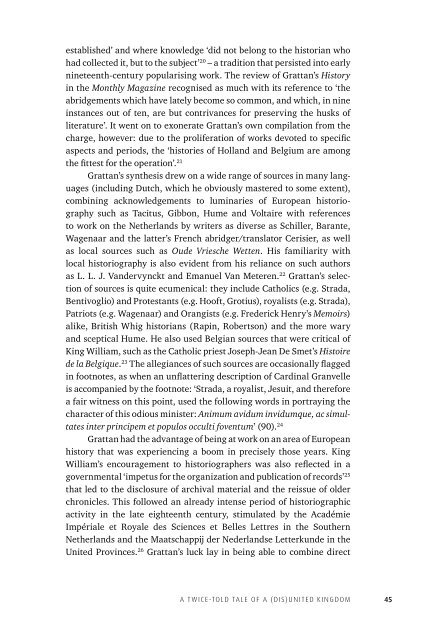Discord Consensus
7aze300jFJo
7aze300jFJo
You also want an ePaper? Increase the reach of your titles
YUMPU automatically turns print PDFs into web optimized ePapers that Google loves.
established’ and where knowledge ‘did not belong to the historian who<br />
had collected it, but to the subject’ 20 – a tradition that persisted into early<br />
nineteenth-century popularising work. The review of Grattan’s History<br />
in the Monthly Magazine recognised as much with its reference to ‘the<br />
abridgements which have lately become so common, and which, in nine<br />
instances out of ten, are but contrivances for preserving the husks of<br />
literature’. It went on to exonerate Grattan’s own compilation from the<br />
charge, however: due to the proliferation of works devoted to specific<br />
aspects and periods, the ‘histories of Holland and Belgium are among<br />
the fittest for the operation’. 21<br />
Grattan’s synthesis drew on a wide range of sources in many languages<br />
(including Dutch, which he obviously mastered to some extent),<br />
combining acknowledgements to luminaries of European historiography<br />
such as Tacitus, Gibbon, Hume and Voltaire with references<br />
to work on the Netherlands by writers as diverse as Schiller, Barante,<br />
Wagenaar and the latter’s French abridger/translator Cerisier, as well<br />
as local sources such as Oude Vriesche Wetten. His familiarity with<br />
local historiography is also evident from his reliance on such authors<br />
as L. L. J. Vandervynckt and Emanuel Van Meteren. 22 Grattan’s selection<br />
of sources is quite ecumenical: they include Catholics (e.g. Strada,<br />
Bentivoglio) and Protestants (e.g. Hooft, Grotius), royalists (e.g. Strada),<br />
Patriots (e.g. Wagenaar) and Orangists (e.g. Frederick Henry’s Memoirs)<br />
alike, British Whig historians (Rapin, Robertson) and the more wary<br />
and sceptical Hume. He also used Belgian sources that were critical of<br />
King William, such as the Catholic priest Joseph-Jean De Smet’s Histoire<br />
de la Belgique. 23 The allegiances of such sources are occasionally flagged<br />
in footnotes, as when an unflattering description of Cardinal Granvelle<br />
is accompanied by the footnote: ‘Strada, a royalist, Jesuit, and therefore<br />
a fair witness on this point, used the following words in portraying the<br />
character of this odious minister: Animum avidum invidumque, ac simultates<br />
inter principem et populos occulti foventum’ (90). 24<br />
Grattan had the advantage of being at work on an area of European<br />
history that was experiencing a boom in precisely those years. King<br />
William’s encouragement to historiographers was also reflected in a<br />
governmental ‘impetus for the organization and publication of records’ 25<br />
that led to the disclosure of archival material and the reissue of older<br />
chronicles. This followed an already intense period of historiographic<br />
activity in the late eighteenth century, stimulated by the Académie<br />
Impériale et Royale des Sciences et Belles Lettres in the Southern<br />
Netherlands and the Maatschappij der Nederlandse Letterkunde in the<br />
United Provinces. 26 Grattan’s luck lay in being able to combine direct<br />
A twice-told tale of a (dis)united kingdom 45


